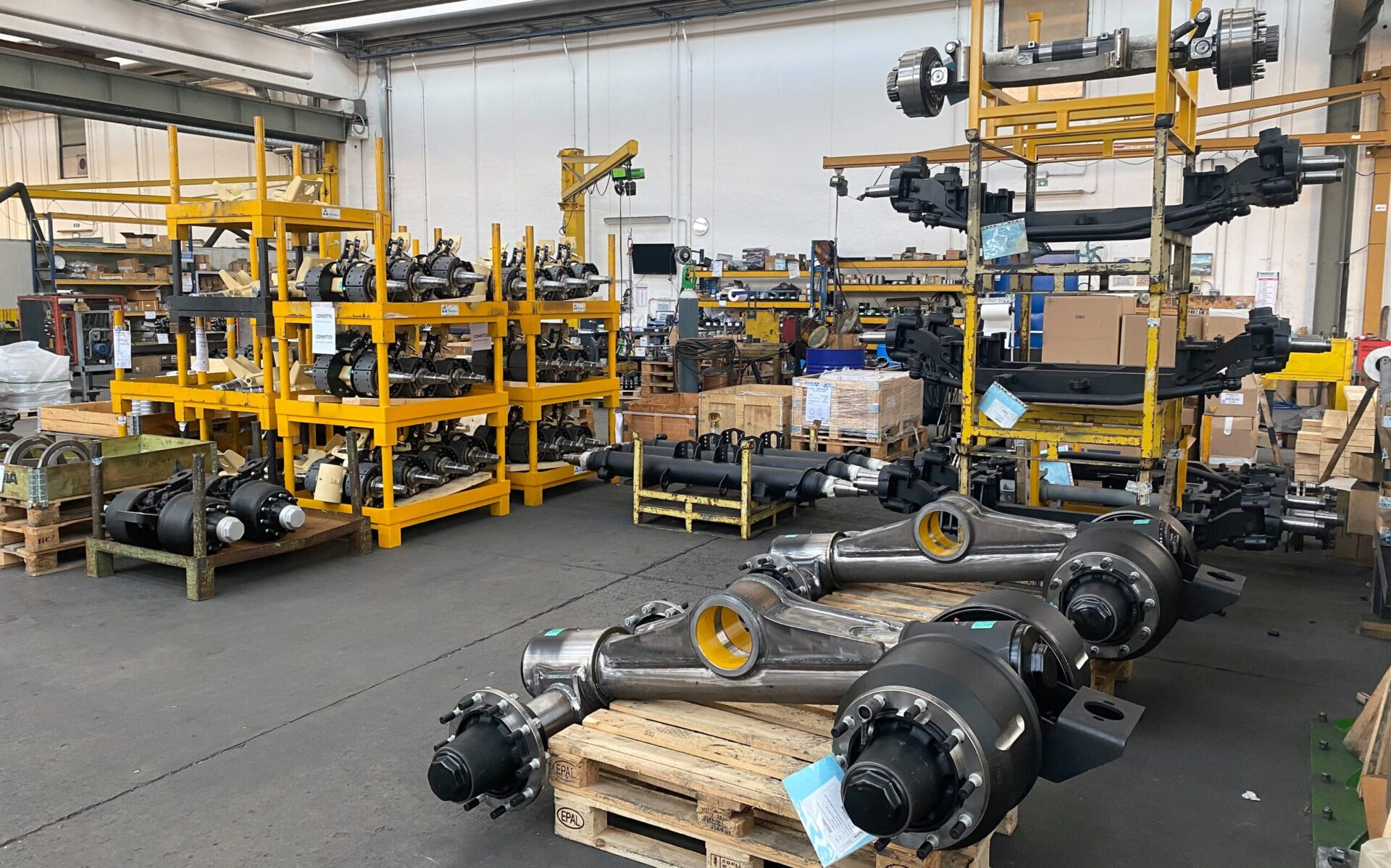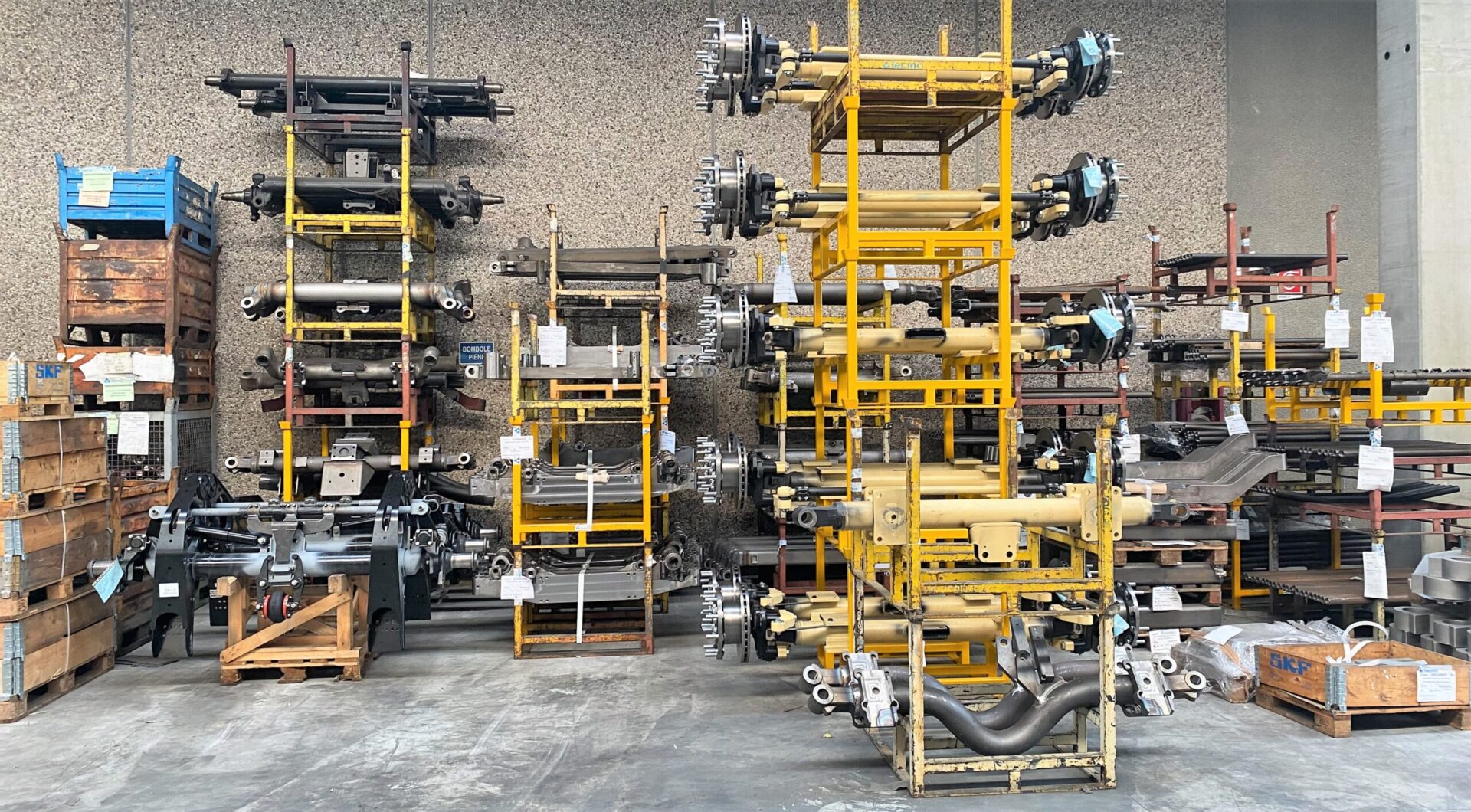Tecma, a metalworking company active in the province of Verona, wanted to innovate methods and tools used to plan production by implementing the APS CyberPlan. The project, told by Francesco Fasoli, Commercial Technician of the Venetian company, allowed to obtain a process that brought sharing, objectivity and speed to support the great production growth.
Tecma, Venetian production of highly specialised axles and suspensions for industrial vehicles
Tecma is a company specialised in the design and production of axles and suspensions, mainly for industrial vehicles operating within shipyards, construction sites, civil and mega constructions.
The company, which turned 30 in 2022, boasts a strong design know-how and many projects are carried out on order in ETO mode in close collaboration with the customer. All axles, in fact, are customised to the specific needs and requests of the customer, which determines the creation of lists and work cycles that are also customised. In some cases the product is already defined but in many other cases it starts from a blank sheet and everything is designed from scratch. From there, we proceed with the design, keeping the production capacity under control both from a technical point of view and from the availability of materials on the market. Tecma products are born from this process, highly specialised for each customer.
As for Tecma’s organization, it is divided into two production plants, both in Campagnola di Zevio: in the first there are the offices, the machine tool park, the assembly and warehouse park; while in the second there is the welding park with 5 robotic islands and a small stock of welding material.
“Tecma works like this: connection with the customer.” Francesco Fasoli

Improve the production planning process to support strong growth
The need to innovate methods and tools used for production planning was born from the strong growth in sales orders and turnover. At the time, production planning was carried out starting from the analysis of individual orders, one by one and with a lot of work on the part of the operators: the planners issued purchase orders by entering data based on the experience, sensitivity and knowledge of the individual operator. This method required a great deal of effort on the part of the planners, the potential risks at the level of continuity and the inaccuracies at the level of dates and estimated times. In addition, the management of unforeseen events was difficult, there were often missing items and it was not possible to share production plans quickly. Tecma initially carried out the analysis of needs with ERP and external artisanal Access files; later, the strong growth in turnover made it humanly unsustainable to manage needs and production with these methods. The situation had become critical as unimportant materials could block an entire order and consequently also a certain turnover.
“We understood that we needed software that did not replace the person but that helped them manage the amount of data and needs that came as a result of the increase in sales orders. I joined the company precisely at that historical moment and from the moment I saw CyberPlan it was love at first sight, from there the implementation with Zucchetti started.“Francesco Fasoli
Moreover, when creating highly specialised products in the production department, it is not unusual to find at the same time more than 50 orders that can derive from more than 50 different items, with 50 different bases and 50 different work cycles. The typical work cycle of an axle involves several steps that go from one processing station to another among the existing ones: machine tool processing, turning, milling, welding, pre-assembly, etc. There is therefore no real flow of departure and arrival, even as a layout, but the processes that are needed are carried out. This implies the need to manage the capacity of the work centres and the need for materials to have them available at the right time. The company therefore manages very complex scenarios, which benefit greatly from the benefits of an APS solution. Tecma, having identified critical issues and solutions, therefore did not waste time and implemented CyberPlan first with the management system already in use and then adopted a new ERP (Microsoft Dynamics 365 Business Central) implemented according to CyberPlan.
“CyberPlan for Tecma is the main software, it is the software on which people interface (Production, Sales, Purchasing). The management system is the tool we use to get things done, but we all get the reading and information from CyberPlan. CyberPlan is the main software and the ERP is at the service of CyberPlan.”Francesco Fasoli

Innovation of methods and tools to plan production objectively
Having understood which areas needed to be improved and on which it was necessary to intervene to achieve the objectives, Tecma then implemented the APS and then adopted a new ERP.
The first phases of the project required an arrangement and reorganization of the databases, which brought indirect benefits on other aspects as well. Today almost every company department feeds CyberPlan with specific data and when Tecma consults the tool it is certain that the data is perfectly up to date with all the latest developments in the company.
CyberPlan is used by Tecma to carry out the calculation of the MRP of the materials and the scheduling of the work centres with the use of the finished capacity. Thanks to the APS, Tecma also generates transfer orders and therefore knows where to transfer a certain number of pieces to the subcontractors’ warehouses, in addition to having visibility over the stocks. Account workers therefore also benefit indirectly from the use of CyberPlan because they benefit from the work that Tecma carries out with it for operations such as import and export or purchases and sales.
“A very effective thing about CyberPlan is the interface, because it allows me to have all the information undermy eye. If I had to manage these things with a management system, I would have to open at least 5 different pages. Instead with CyberPlan clicking on an article, I can see all the information I need.“Francesco Fasoli
CyberPlan is also used for the sales of spare parts and as an interface to check the timing to be communicated to the customer. Every week, then, the CyberPlan tool is the fulcrum around which the meeting that takes place between the sales and production departments revolves, in which sales orders are verified and analyzed through filters and sorting.
In addition, all Tecma purchase orders are placed with CyberPlan. Every time an order or a new master data is entered, great attention is paid to the data of the need (lead time, safety lead time, minimum stocks, etc.); then the MRP or ODA analyses are carried out and, thanks to pre-set filters, analyses and verifications are carried out.
CyberPlan is also used to communicate with software used for treasury analysis, bank management and cashflow, therefore for economic and financial decisions. In particular, CyberPlan manages sales orders and related data, including production and work orders or purchase proposals; the latter are forwarded to the financial software. The software checks that the supplier has set the delivery date, checks the type of payment needed and creates a financial deadline. In this way, evaluations can be made on the flow of future outputs generated by CyberPlan.

Benefits and improvements for different company departments thanks to a shared plan
“We’ve achieved all the results we hoped for.”
“CyberPlan provides me with directly usable information, I no longer have to calculate anything and I know that it is correct information.” Francesco Fasoli
The CyberPlan implementation project has led Tecma to achieve remarkable results, also thanks to the great work of data preparation and cleaning. Here are some of the results the company has achieved:
- Contingency management: “We found a huge advantage in the immediate response of activities throughout the production plant, even after a very small variation; a sudden absence of a collaborator, for example, is immediately managed by generating a new plan based on this unforeseen event”,
- Significant reduction of the missing ones: “The materials that were missing before are no longer missing and if they are missing, they are certainly not missing because it was our oversight but because the supplier has a delivery delay”,
- Improvement of the use of the work centre,
- Better stock management: “Both in absolute terms and in relation to subcontractors, where we went from 0 to 100”,
- Management of subcontractors’ needs,
- Data sharing and communication between departments: “Two necessary and fundamental things; being able to update the plan at any time and knowing that your colleagues see it is definitely a wonderful thing”,
- Confidence in making decisions: “We know that every decision is supported by CyberPlan and we know the consequences on the production department, this is the best for us”.
The results were therefore to the direct benefit of the company and the subcontractors, but also and above all of Tecma’s planners, whose working method has evolved considerably “the work of the planner from before to after has totally changed, before the needs of the single order were analysed, today the needs of the entire production system are analysed, together, at the same time“, says Fasoli.
Before, the planner entered purchase orders item by item when stocks went negative, entering lead times and safety lead times decided on the basis of a mix of experience, sensitivity and knowledge of the individual operator, but not objective data.
Now the goodness of the output derives from the design and the data entered upstream, the technical department communicates to CyberPlan a series of data and information contained in the article master data that are linked to the need. Thanks to clear, precise and shared information, the planning has allowed Tecma to obtain a serenity of management that has allowed operators to dedicate themselves to higher-value activities.
CyberPlan, to plan and schedule production in an advanced way
Tecma’s great results were the result of an important data review, the evolution of processes and the adoption of the Advanced Planning and Scheduling CyberPlan tool. Thanks to advanced logics such as finite-capacity scheduling and high computing power deriving from the database in RAM, APS allows manufacturing companies to plan production in a modern and shared way. Learn how to implement this tool in your company.
